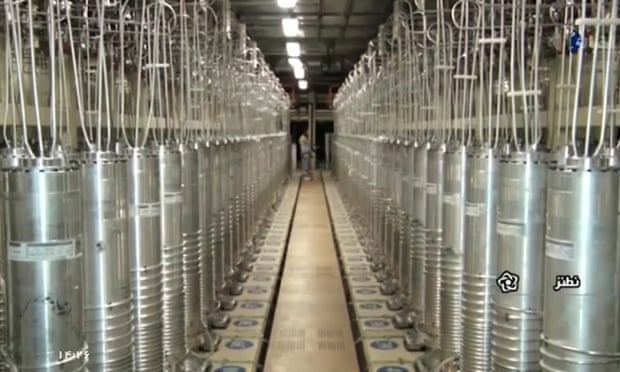Iran and the UN’s nuclear watchdog, the International Atomic Energy Agency (IAEA), have overcome their differences to seal a one-month “stop-gap” extension of limited UN inspections of Iran’s nuclear activities.
The agreement, lasting until 24 June, comes despite the speaker of the Iranian parliament, Mohammed Bagher Ghalibaf, claiming on Sunday that the previous three-month agreement had expired and implying it might not be replaced.
Rafael Grossi, the IAEA director general, said the new extension meant his inspectors would not be “flying blind”, and would leave the door ajar to fuller access in the future.
The deal ensures that data filmed by IAEA inspectors inside Iran’s nuclear plants over the past three months will not be destroyed, and filming will continue for a further month. But Grossi said he had no guarantee that his experts would have access to the data after the 24 June expiry, by which time Iran will have elected a new president.
The one-month extension probably means the wider talks on the US lifting sanctions on Iran and returning to the nuclear deal – known as the Joint Comprehensive Plan of Action (JCPOA) – can recommence this week in Vienna. The talks have been billed as a final and decisive round.
If Iran and the US can reach agreement on the US return, then the IAEA will be given access to the video recordings, including the levels of uranium enrichment.
There has been a power struggle in Tehran linked to its presidential elections on how far to compromise with the US to secure the lifting of crippling economic sanctions. The battle over the one-month extension may have been part of that power struggle, so its resolution suggests Iran’s negotiators think a deal within the month is possible.
The US would probably have pulled out of the Vienna talks had the IAEA not reached agreement on its conditional right to see videos of what Iran was doing inside its sites, including in terms of uranium enrichment.“If levels of access are restored, we can reconstruct what is happening,” Grossi said. “It is not ideal. It is an emergency device in order for us to continue having these monitoring activities.”
Iran’s chief negotiator, Abbas Araghchi, spent four hours in front of the national security commission of Iran’s parliament on Sunday setting out the foreign ministry’s negotiating position and the progress on the talks.
“Very tough, but useful,” was how he characterised the discussion on Monday in a tweet, adding: “The bottom line is, having left the JCPOA, the US must first provide verifiable sanctions lifting. Iran will then resume full implementation.”
In 2018 Donald Trump pulled the US out of the JCPOA, which had been agreed in 2015. Iran is now seeking for the US to lift all the new sanctions imposed. The US says some of the sanctions are not related to Iran’s nuclear activities and should stay in force until Iran changes its behaviour on human rights and ends its act of “regional destabilisation”.
On Sunday, the US secretary of state, Antony Blinken, claimed the US still did not know whether Iran would comply with its nuclear commitments in order to have the sanctions removed.
“Iran, I think, knows what it needs to do to come back into compliance on the nuclear side, and what we haven’t yet seen is whether Iran is ready and willing to make a decision to do what it has to do. That’s the test and we don’t yet have an answer,” Blinken told ABC News.
In a Monday morning riposte by tweet, Iran’s foreign minister, Javad Zarif, dismissed Blinken’s statement, saying that bullying “didn’t work for Trump – won’t work for you”.
He said the US had a moral obligation to lift sanctions: “Release the Iranian people’s billions of dollars held hostage abroad due to US bullying. Trump’s legacy is past its expiration date.”
The Iranian foreign ministry spokesperson Saeed Khatibzadeh told reporters: “We have had very significant progress and still think that an agreement is within reach.”






